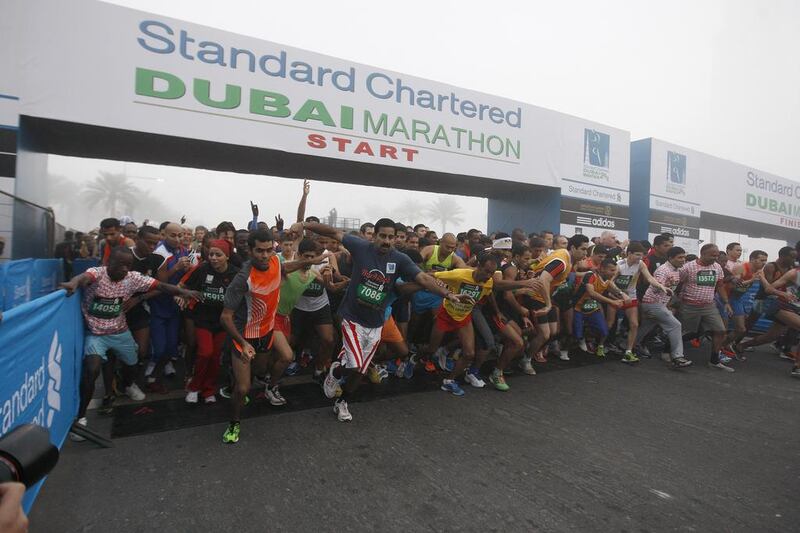Twenty thousand runners, 20,000 inspirations. The Standard Chartered Dubai Marathon may be the world’s richest race, but for most participants it has very little to do with prizes.
“I have always wanted to run a marathon, it is on my bucket list, but I finally decided to train for this year’s edition after one of my best friends died last year,” Pedro Echevarria of Spain said. “So this marathon goes out to him. I will wear a T-shirt saying ‘This is for you, Javi’.”
First the inspiration, then the dedication.
“I decided I wanted to do something special for my friend, right after he passed away in March,” Echevarria, 33, who is an assistant director of sales at the Yas Viceroy Hotel said.
“I started to run five-to-10 kilometres only, without any structure or proper schedule. It was only after the summer that I started to take it seriously and train harder.”
Like many first-time marathon runners, Echevarria found the mental preparation as trying as the physical one.
“It is tough at the beginning when you are not used to running more than five kilometres. Your knees and legs hurt, it is either cold or hot, and you think you are stuck in your progression,” he said.
“But honestly, it is harder mentally. Training for a marathon is not just about running and slowly increasing the number of kilometres. It requires consistency, modifying eating habits, lifestyle, and working on a combination of distances and paces.”
For Echevarria, maintaining a healthy diet and lifestyle were essential if the marathon is to be completed.
“I try my best to eat healthier at least five days a week, and I gave myself one cheat day,” said the Spaniard, who has lived in the UAE for the past six and a half years. “My lifestyle has become more sporty, without being too obsessive.”
Typically a week’s training sees four long runs, one of which is 15-to-25km, the rest shorter distances at different pace.
He has now run five half-marathons as part of his training.
The Dubai Marathon sees the conclusion of long-term life targets for other contestants from around the world.
Alex Flynn, 40, from Britain will complete his 10 Million Metre challenge, a global mission to raise £1 million (Dh6m) in sponsorship for The Cure Parkinson’s Trust.
Flynn, a lawyer, was diagnosed with Parkinson’s five years ago, and since then has become the face of a campaign that he has already clocked up 9,599,315 metres.
The 10 million-metre mark is set to be crossed during the final few kilometres tomorrow.
“Back in 2011, I ran the Standard Chartered Dubai Marathon for the first time and got a huge amount of support,” Flynn said. “This time I’ll savour it and enjoy the experience as this will be a very special event for me as the final marathon in the challenge.”
Others face unique challenges.
Rob Smith, another Brit, will be looking for his fourth consecutive Dubai triumph in the wheelchair category.
“The Dubai course is fast and flat, which has both its advantages and disadvantages,” Smith said.
“The lack of hills is good as it means there are no hard uphill sections, but that also means there are no downhills so there is zero chance to rest for a few seconds on the down slope.”
For the majority, however, it is a once-in-a-lifetime opportunity to rub shoulders with the world’s best, raise some cash for charity and, let us not forget, to simply have fun, whether running the full marathon or the 10km.
“I did the 10km run last year. It was my New Year’s resolution,” says Cecilia Clason Skjorten of Norway. “I was with a group of friends and we decided over the New Year’s Eve celebrations to do it.”
This year, Skjorten, an interior designer, is raising money for a charity that helps refugees affected by the war in Syria.
Signing up for last year’s 10km run just weeks before the race was, considering the timing, a tough call.
“I’d been exercising but hadn’t done too much running, so I decided I’d rise to the challenge,” she said. “I was nervous at first but made up my mind that I’d run as much as I can and then walk the rest.”
It paid off, and she even surprised herself. “Once I was out there, the adrenalin carried me and I ended up running about 90 per cent of it,” she said. “The sense of achievement was amazing.”
Her experience has rubbed off on others, too.
“When I was in Norway during the summer, I told a friend about it and now she’s flying out specifically for the race,” Skjorten, 43, said.
The camaraderie between the runners is what keeps her going.
“I’d say one thing for sure, if it wasn’t for the other people, there’s no way I could do the 10k on my own,” the resident of Dubai for eight years said.
“At first I was worried, thinking should I do the marathon or should I do the 10k? But once you’re out there you realise it’s for everybody.”
The serious athletes may disappear over the horizon, but Skjorten’s lasting memory is of the runners around her enjoying themselves.
“Some people were walking, and some were in fancy dress. It had such a positive vibe,” she said. “I’d call it group euphoria, adrenalin, it just carries you and makes you run more. It’s quite contagious.”
Just like Flynn, Smith and Skjorten, thousands of others have caught the bug, making the Dubai Marathon a sporting event with the biggest participation in the Middle East.
As for newcomer Echevarria, one thought will drive him towards that finish line in the shadow of Burj Al Arab. “Javi, he is my inspiration.”
akhaled@thenational.ae
Follow us on Twitter @SprtNationalUAE





